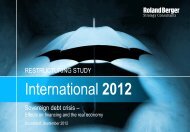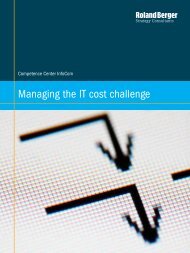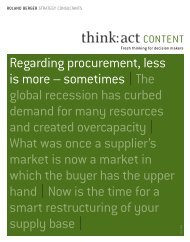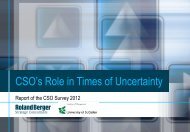issue 1 - Roland Berger
issue 1 - Roland Berger
issue 1 - Roland Berger
Create successful ePaper yourself
Turn your PDF publications into a flip-book with our unique Google optimized e-Paper software.
Interview DOSSIER #01<br />
What does that mean in plain language?<br />
It means that the total debt ratio will be much more<br />
strictly observed and monitored in the future than it<br />
has been in the past, especially during periods of<br />
economic prosperity. We are convinced that the willingness<br />
to enact reforms should not take a back<br />
seat to any policies motivated by pressing shortterm<br />
needs. Warning countries of impending economic<br />
problems is much more effective than<br />
complaining about them once they’ve become manifest.<br />
But to be in a position to <strong>issue</strong> these warnings,<br />
we have to receive, verify and analyze national<br />
budgetary information and the long-term economic<br />
and business plans well ahead of time. Only then can<br />
we <strong>issue</strong> corrective recommendations.<br />
How do you intend to ensure compliance?<br />
Rest assured, we shall see to it that our recommendations<br />
are implemented. The time for leniency and<br />
understanding is over. The stability pact will not be<br />
undermined. It is not to be viewed as merely a list<br />
of invalidating circumstances. It is and remains the<br />
EU directive.<br />
But none of this will help if the figures submitted by<br />
member states are incorrect, or if warnings are<br />
ignored. After all, national governments ultimately<br />
decide their own labor market policy, shape their<br />
social system as they see fit, and set their country’s<br />
level of taxation, and they do this entirely independently<br />
of Brussels.<br />
Naturally, the case of Greece came as quite a shock,<br />
despite the fact that in 2000 the Luxembourg-based<br />
statistical office, Eurostat, had already begun to<br />
audit the data it had received from Athens. Nevertheless,<br />
the size of the discrepancies is very much a<br />
cause for concern. But what sense would it make to<br />
ignore our constructive recommendations? Twothirds<br />
of the total trade volume of the expanded<br />
Union takes place within Europe. Does it not therefore<br />
seem entirely sensible to take heed of our<br />
reform proposals? Of course, I should add that we<br />
too must exercise self-criticism as we go about our<br />
work. We need to implement internal reforms and<br />
publicize our proposals and successes to the European<br />
public more broadly and transparently.<br />
JOAQUÍN ALMUNIA, 56, is the EU commissioner<br />
for economic and monetary affairs. He was<br />
born in Bilbao in the Basque region of Spain. After<br />
studying law and economics at the University of<br />
Deusto (Bilbao) and in Paris, he lectured on labor<br />
law at the University of Alcalá de Henares in<br />
Madrid, and participated in the Harvard “Senior<br />
Managers in Government” program. Almunia entered<br />
politics in 1974 as a member of the UGT trade<br />
union, which has close links with the Socialist<br />
Labor Party of Spain. He became a member of the<br />
Spanish Parliament in 1979. During the premiership<br />
of Felipe Gonzales, Almunia took on greater<br />
responsibility, initially as the minister of employment<br />
and social security from 1982 to 1986, then<br />
as minister of public administration until 1991.<br />
Almunia has a reputation for being dialog-oriented<br />
and open to compromise. He has already begun to<br />
deal with the hottest <strong>issue</strong> of them all: reform of<br />
the European stability pact.<br />
The penalty for exceeding the 3 percent maximum<br />
can amount to as much as 0.5 percent of a country’s<br />
GDP. The EU budget could make good use of those<br />
additional funds, couldn’t it?<br />
In my opinion it simply isn’t advisable to impose<br />
an additional debt burden on countries in this way,<br />
thereby further constraining entire national<br />
economies. The question once again is, What is the<br />
best course to take if the growth rate is very low and<br />
national debt can’t be kept below a certain limit? We<br />
have to take such phases of stagnation into account<br />
in the interests of the entire community of states.<br />
Isn’t there a risk that member states, especially the<br />
new ones, will note the bad examples, and that budget<br />
discipline within the EU will weaken across the board?<br />
I’m hoping for the opposite. After all, the states exchange<br />
information and can learn from each other’s<br />
mistakes. Naturally, much more can still be learned.<br />
But in many cases the actual situation within the EU<br />
is more complicated than it seems. We have to find<br />
ways to set a realistic and future-oriented agenda,<br />
preserve what is tried and tested, critically analyze<br />
what we currently have, and be open to change. We<br />
need to start rethinking what we know.<br />
How do you envision this rethinking process?<br />
It makes little sense always merely to be rushing<br />
around repairing the mistakes of yesterday. Our strategy<br />
is about avoiding mistakes in the first place. For<br />
this the individual economic policies of the EU member<br />
states need to be more effectively coordinated.<br />
What new procedures does the Commission have up<br />
its sleeve for bringing this about?<br />
Careful observation of national budgets and more<br />
transparency about problems and possible negative<br />
developments, without losing sight of the overall<br />
goal of creating an economically stable EU. This kind<br />
of constructive partnership has been practiced far<br />
too little in the past. In many cases, our recommendations<br />
were down on paper but never implemented.<br />
But pressure and sanctions from the top will go only<br />
so far in bringing about the necessary change in the<br />
way member states go about looking at the <strong>issue</strong>s.<br />
According to reform proposals, more attention needs<br />
to be paid to the quality of national expenditure.<br />
Moreover, expenditure on education and research, it<br />
is suggested, should be removed from the calculation<br />
of national deficits. It's an interesting fact that<br />
the new member states have on average invested<br />
more in education than have the old member states.<br />
Would allowing the deduction of spending on education<br />
be a sensible signal?<br />
That needs to be examined carefully and discussed,<br />
bearing in mind that the goals of the stability pact<br />
are unchanged. We also have to make sure no obstacles<br />
stand in the way of structural development.<br />
think: act 37
















